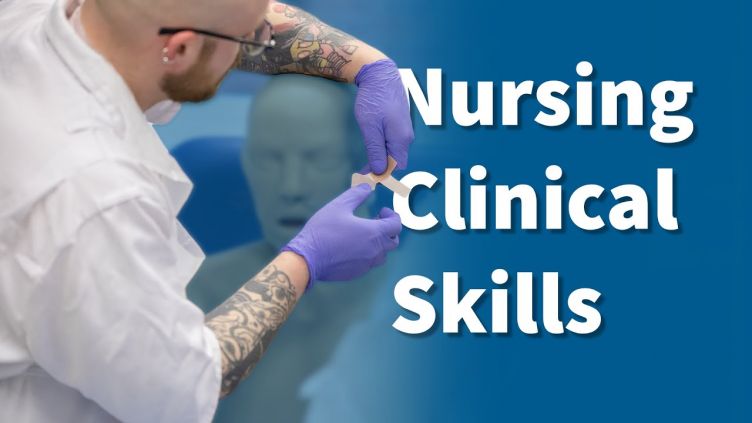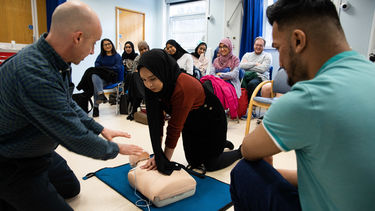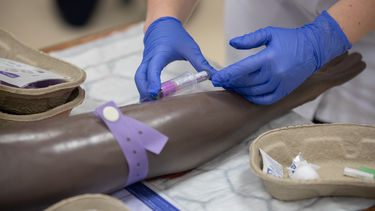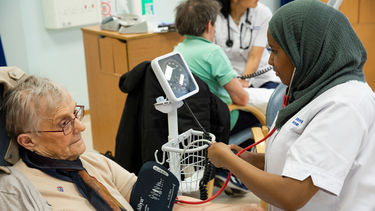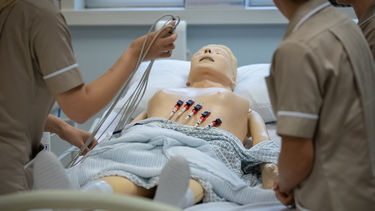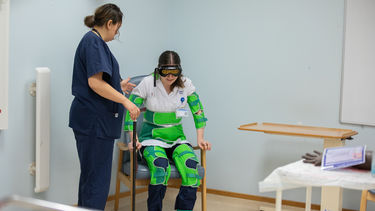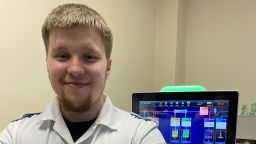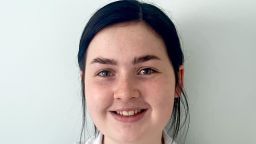Nursing (Adult) BMedSci
Become an adult nurse and make a difference every day. Equip yourself with the clinical skills, knowledge and confidence you need to register with the Nursing and Midwifery Council (NMC) and deliver exceptional care to patients.
-
A Levels
BBB -
UCAS code
B740 -
Duration
3 years -
Start date
September
- Accredited
- Course fee
- Funding available
- Industry placement
Explore this course:
Course description
Why study this course?
The Complete University Guide 2025
The Guardian University Guide 2025
The Times University Guide 2025
Annual NHS grants are available for all eligible UK home students to help you with your studies, as well as funding to cover the cost of placements.
Put your theory into practice in a safe, supportive environment. Our Clinical Skills Centre features mock wards, resuscitation suites, simulation theatres and homes, and VR equipment.
You’ll spend half your time on clinical placements in a range of community, primary care and hospital settings. Placement support is crucial to success, and you’ll get that from our hospital supervisors and assessors, academic staff and our dedicated Clinical Practice Support Educator.

Be at the heart of healthcare, working directly with patients and clinicians to improve and save lives every day.
Study an adult nursing degree at Sheffield and we’ll show you why this profession is as rewarding as it is challenging, with plenty of opportunities to grow into a life-long career.
Informed by the latest research, this degree will provide you with excellent preparation to become a registered adult nurse. You’ll split your time equally between studying theory and building experience on placement.
It’s here, working directly with clinicians and patients, that you’ll develop skills in leadership, problem-solving, communication and resilience – all crucial to becoming a capable and compassionate nurse.
Throughout the three-year programme you’ll be taught by qualified nurses and healthcare professionals – both in the classroom and out on placement – who will support you to become the very best nurse you can be.
Nursing and Nursing Associate apprenticeships
The University of Sheffield also offers degree apprenticeship routes into Nursing, with both a Nursing Associate programme and an 18-month Nursing Top-up programme. Apprenticeship places are advertised locally in partnership organisations (such as NHS jobs), with teaching split into work-based learning and “off-the-job” learning (university study days and alternative placements). Both courses are accredited by the Nursing and Midwifery Council (NMC).
If you are an employer interested in having a Nursing or Nursing Associate apprenticeship in your clinical area, or you're looking to find out more about studying for an apprenticeship yourself, follow the link below or email ahpnm-apprenticeships-admissions@sheffield.ac.uk for more information.
Learn more about apprenticeships
Foundation courses
Mature students without standard entry qualifications can also study this course with a foundation year, which prepares them for degree-level study. For more information and entry requirements, visit Lifelong Learning.
This course is approved by the Nursing and Midwifery Council (NMC). It will give you the clinical skills and knowledge you need for entry into the NMC professional register as an adult nurse.
Modules
A selection of modules are available each year - some examples are below. There may be changes before you start your course. From May of the year of entry, formal programme regulations will be available in our Programme Regulations Finder.
Choose a year to see modules for a level of study:
UCAS code: B740
Years: 2022, 2023, 2024, 2025
Core modules:
- Health and Nursing 1
-
This module will lay the foundation level, knowledge, skills and professional attributes and values required for contemporary nursing practice. It offers students a broad and applied introduction to the study of nursing through the lifespan and its practice within contemporary health and social care. Students will explore the wider aspects of health and illness and issues which impact upon them. Students will be encouraged to take the opportunity to work with people from different fields of nursing practice in the context of adult nursing. The content delivered will be underpinned by The Code (NMC, 2018).
40 credits - Health and Nursing 2
-
This module will continue to lay the foundation level, knowledge, skills and professional attributes and values required for contemporary nursing practice. It continues to offer students a broad and applied introduction to the study of nursing through the lifespan and its practice within contemporary health and social care. Students will explore the wider aspects of health and illness and issues which impact upon them. Students will again be encouraged to take the opportunity to work with people from different fields of nursing practice in the context of adult nursing. The content delivered will be underpinned by The Code (NMC, 2018).
40 credits - Academic Skills and Digital Capability for Nursing in Healthcare
-
This module will run across two semesters and will facilitate and support student transition into higher education. Students will develop their Sheffield Graduate Attributes that will prepare them for life-long learning and future employability as a nursing registrant.
20 credits - Anatomy and Physiology for Nursing
-
This module will run over two semesters. Students will explore the main body systems and changes that occur through the ageing process and apply this within an adult nursing environment.
20 credits - Professional Practice 1 for Nursing
-
This module will consist of four placement blocks in year one in which the foundational skills required by an adult nurse will be developed. You will apply your underpinning knowledge and skills within a planned and supervised practice experience. You will work with and learn from a range of people in a variety of practice placements, preparing you to provide care to people with diverse needs. You will demonstrate your learning by completing essential documentation.
Core modules:
- Caring for People with Long Term and Complex Care Needs
-
This module is designed to enable the students to further develop their nursing skills and professional values whilst focussing on people with long term and complex needs. They will seek to understand the unique needs and experiences of adults and families living with long term conditions, and the significance of multi-agency collaboration across the health and social care sectors. This will be achieved by drawing the students' attention to current policy, practice and research. In addition, psychological, physiological and sociological perspectives are explored. The module will develop understanding of the importance of user/carer expertise in healthcare decision making.
40 credits - Caring for People with Acute and Short Term Needs
-
This module is designed to enable the students to further develop their understanding of the evidence based principles which underpin contemporary nursing practice through focusing specifically on people with short term acute and critical care needs. It offers a critical examination of the fundamental and specialist knowledge, skills and values required of the professional nurse and examines the nature of the nurse's contribution in ensuring safe and effective multidisciplinary/multi agency practice. The module will develop understanding of the importance of communication when discussing people with acute and critical care needs.
40 credits - Pharmacology and Medicines Management for Nursing
-
This module is designed to enable students to develop their understanding of pharmacology within a healthcare context. They will increase their knowledge base regarding the medications used for people with long term and complex care needs as well as short term and acute care needs.
20 credits - Research Methods and Evidence Based Practice for Nursing
-
This module is designed to enable students to understand research methods including quantitative, qualitative and literature reviews that underpin nursing and healthcare practice.
20 credits
An ability to understand research methods is important for information skills and underpins the skills of critical thinking and analysis which are desirable Sheffield Graduate Attributes. Students will be able to articulate the underpinnings of different approaches to studying evidence based practice. - Professional Practice 2 for Nursing
-
This module will consist of three placement blocks in year two in which the skills required by an adult nurse will be developed. You will apply your underpinning knowledge and skills within a planned and supervised practice experience. You will demonstrate your learning by completing essential documentation.
Core modules:
- Transitions to Professional Nursing Practice 1
-
This module is designed to enable the students to critically analyse the evidence based principles which underpin nursing interventions as they develop into autonomous practitioners. It offers a critical examination of the fundamental and specialist knowledge, skills and attitudes required of the nurse and examines the nature of the nurse's contribution in effective multidisciplinary care and management.
40 credits - Transitions to Professional Nursing Practice 2
-
This module will consolidate learning of all NMC standards and facilitate students to seek out, critically analyse, make judgements upon and implement best evidenced based practice as they transition into autonomous and accountable nurse practitioners. It offers a critical examination of the knowledge, skills and values required of the professional nurse. Students will be enabled to understand and practise effective management and leadership skills as they transition into autonomous nurses in the context of effective multidisciplinary, multi-agency and integrated care practice.
40 credits - Developing Nursing Practice
-
This module is designed to enable the students to complete a project based on a subject relevant to the adult field of nursing. Students will critically evaluate clinical practice using evidence based literature and make recommendations for future practice. This will enable students to become independent, accountable practitioners ensuring that their practice is evidence based.
40 credits - Professional Practice 3 for Nursing
-
This module will consist of three placement blocks in year three in which the skills required by an adult nurse will be developed. You will apply your underpinning knowledge and skills within a planned and supervised practice experience. You will demonstrate your learning by completing essential documentation.
The content of our courses is reviewed annually to make sure it's up-to-date and relevant. Individual modules are occasionally updated or withdrawn. This is in response to discoveries through our world-leading research; funding changes; professional accreditation requirements; student or employer feedback; outcomes of reviews; and variations in staff or student numbers. In the event of any change we will inform students and take reasonable steps to minimise disruption.
Learning and assessment
Learning
The content of our nursing degree is a 50:50 split between theory and practice.
As well as spending time in lectures and seminars, you will spend a large part of your studies on clinical placement in a range of hospital and community settings. You will also have access to our Clinical Skills Centre where you can develop your practical skills in a safe and supportive environment.
As part of our Patients as Educators programme, you will also get the chance to learn directly from patients in both classroom and practical environments.
Assessment
You'll be assessed by exams, coursework and practical tasks.
Programme specification
This tells you the aims and learning outcomes of this course and how these will be achieved and assessed.
Entry requirements
You must meet the entry requirements for the programme prior to the course start date, which is September each year.
This course is not presently open to international applicants. We are unable to accept international applications, as clinical placement capacity is confined by local staffing requirements.
With Access Sheffield, you could qualify for additional consideration or an alternative offer - find out if you're eligible.
The A Level entry requirements for this course are:
BBB
- A Levels + a fourth Level 3 qualification
- BBC + B in a relevant EPQ; BBC + B in Core Maths
- International Baccalaureate
- 32
- BTEC Extended Diploma
- DDM in a relevant subject
- BTEC Diploma
- DD + B at A Level
- T Level
- Distinction in the Health, Healthcare Science or Science T Level, including grade B in the core component
- Scottish Highers
- AABBB
- Welsh Baccalaureate + 2 A Levels
- B + BB at A Level
- Access to HE Diploma
- Award of Access to HE Diploma in a relevant subject, with 45 credits at Level 3, including 24 at Distinction and 21 at Merit
-
5 GCSEs at grade 4/C including English, Maths and a science
-
Science subjects include Biology/Human Biology, Chemistry, Maths, Physics or Psychology
The A Level entry requirements for this course are:
BBC
- A Levels + a fourth Level 3 qualification
- BBC + B in a relevant EPQ; BBC + B in Core Maths
- International Baccalaureate
- 31
- BTEC Extended Diploma
- DMM in a relevant subject
- BTEC Diploma
- DD + C at A Level
- T Level
- Distinction in the Health, Healthcare Science or Science T Level, including grade B in the core component
- Scottish Highers
- ABBBB
- Welsh Baccalaureate + 2 A Levels
- B + BC at A Level
- Access to HE Diploma
- Award of Access to HE Diploma in a relevant subject, with 45 credits at Level 3, including 15 at Distinction and 30 at Merit
-
5 GCSEs at grade 4/C including English, Maths and a science
-
Science subjects include Biology/Human Biology, Chemistry, Maths, Physics or Psychology
You must demonstrate that your English is good enough for you to successfully complete your course. For this course, we require: GCSE English Language at grade 4/C; IELTS grade of 7.0 with a minimum of 7.0 in Speaking, Reading and Listening, and 6.5 in Writing; or an alternative acceptable English language qualification
Equivalent English language qualifications
Visa and immigration requirements
Other qualifications | UK and EU/international
If you have any questions about entry requirements, please contact the school/department.
Graduate careers
After successfully completing your Nursing (Adult) BMedSci, you will be able to register with the Nursing and Midwifery Council and start your nursing career straight away.
The graduate prospects for a newly qualified nurse are huge, and you could go on to improve people’s lives in a range of settings. You might work in an intensive care unit, GP surgery or hospice, or provide one-to-one care to patients in their homes.
Later on in your career, you could move into clinical research, management or teaching, or take further training to support in theatre procedures or prescribe medication.
Wherever you decide to practise, our BMedSci degree will prepare you for the challenges and opportunities that come with a career in nursing. Our alumni continue to connect with us regularly on the programme and work in a wide variety of areas, using the experience they have gained to support current students.
School of Allied Health Professions, Nursing and Midwifery
The Complete University Guide 2024
The Guardian University Guide 2024
The Times and The Sunday Times Good University Guide 2025

The School of Allied Health Professions, Nursing and Midwifery brings together expertise from across human communication sciences, nursing, midwifery, pharmacy, and orthoptics.
We aim to train compassionate, resilient and highly skilled healthcare professionals and support them throughout their working lives.
We work closely with organisations such as the Department of Health and Social Care, the Nursing and Midwifery Council, The General Pharmaceutical Council, and the Health and Care Professions Council. This means we can offer you high-quality, research-informed courses that meet the needs of the NHS.
Study with us and join a diverse and supportive community, led by passionate teachers, clinicians and researchers who can help you fulfil your ambitions.
We provide an excellent study environment for health professionals across our main campus and Clinical Skills Centre. If you study a health professions course with us, you’ll be based close to the Royal Hallamshire Hospital. The hospital is home to the Sheffield Medical School, and is where you’ll find our dedicated Health Sciences Library.
Facilities
Our Clinical Skills Centre is based at the Northern General Hospital, one of the largest hospitals in the country. It’s a safe, simulated environment where you can put your theory into practice.
The centre contains mock clinical wards, resuscitation suites, simulated theatres and teaching rooms. We are also building a new simulated pharmacy - set to open in 2026 - which will include a dispensary, consultation rooms and dedicated teaching space.
We’re dedicated to providing the very best facilities for training the next generation of the healthcare workforce. That’s why we’re refurbishing our Clinical Skills Centre from 2025 to 2026 to expand our clinical skills facilities. During this time, our clinical skills teaching will take place on central campus, using the same equipment and expertise you would find at our Clinical Skills Centre.
University rankings
Number one in the Russell Group
National Student Survey 2024 (based on aggregate responses)
92 per cent of our research is rated as world-leading or internationally excellent
Research Excellence Framework 2021
University of the Year and best for Student Life
Whatuni Student Choice Awards 2024
Number one Students' Union in the UK
Whatuni Student Choice Awards 2024, 2023, 2022, 2020, 2019, 2018, 2017
Number one for Students' Union
StudentCrowd 2024 University Awards
A top 20 university targeted by employers
The Graduate Market in 2024, High Fliers report
A top-100 university: 12th in the UK and 98th in the world
Times Higher Education World University Rankings 2025
Student profiles
Fees and funding
Fees
Additional costs
The annual fee for your course includes a number of items in addition to your tuition. If an item or activity is classed as a compulsory element for your course, it will normally be included in your tuition fee. There are also other costs which you may need to consider.
Funding your study
Depending on your circumstances, you may qualify for a bursary, scholarship or loan to help fund your study and enhance your learning experience.
Use our Student Funding Calculator to work out what you’re eligible for.
Additional funding
As a Nursing student, you can apply for the NHS Learning Support Fund to help support your studies, which you won’t need to pay back. This includes a training grant of £5,000 per academic year, money back for clinical placement travel costs, as well as extra funding for students with dependent children or those facing hardship.
Visit
University open days
We host five open days each year, usually in June, July, September, October and November. You can talk to staff and students, tour the campus and see inside the accommodation.
Subject tasters
If you’re considering your post-16 options, our interactive subject tasters are for you. There are a wide range of subjects to choose from and you can attend sessions online or on campus.
Offer holder days
If you've made an application to study with us, we may invite you for an interview. If you are then successful in receiving an offer, we'll invite you to one of our applicant days. These applicant days have a strong department focus and give you the chance to really explore student life here, even if you've visited us before.
Campus tours
Our weekly guided tours show you what Sheffield has to offer - both on campus and beyond. You can extend your visit with tours of our city, accommodation or sport facilities.
Events for mature students
Mature students can apply directly to our courses. We also offer degrees with a foundation year for mature students who are returning to education. We'd love to meet you at one of our events, open days, taster workshops or other events.
Apply
Make sure you've done everything you need to do before you apply, including reading about the nursing selection process for this course.
When you're ready to apply, visit the UCAS website:
This course is not presently open to international applicants.
The awarding body for this course is the University of Sheffield.
Recognition of professional qualifications: from 1 January 2021, in order to have any UK professional qualifications recognised for work in an EU country across a number of regulated and other professions you need to apply to the host country for recognition. Read information from the UK government and the EU Regulated Professions Database.
Any supervisors and research areas listed are indicative and may change before the start of the course.

